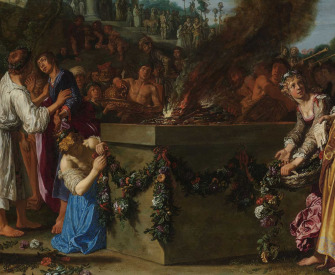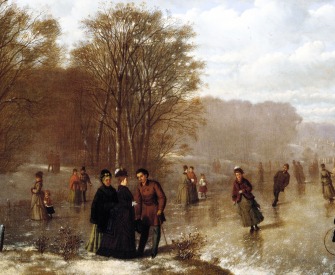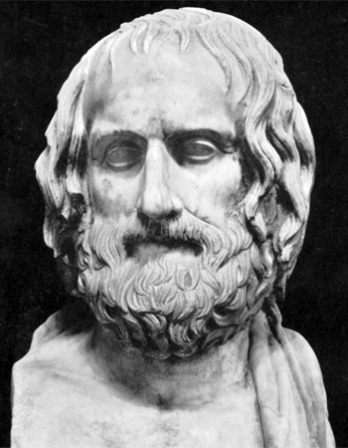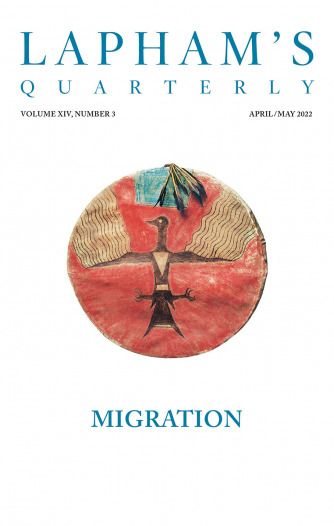[The palace. Enter Priam, Hector, Troilus, Paris, and Helenus.]
Priam: After so many hours, lives, speeches spent,
Thus once again says Nestor from the Greeks:
“Deliver Helen, and all damage else,
As honor, loss of time, travail, expense,
Wounds, friends, and what else dear that is consumed
In hot digestion of this cormorant war,
Shall be struck off.” Hector, what say you to’t?
Hector: Though no man lesser fears the Greeks than I
As far as toucheth my particular,
Yet, dread Priam,
There is no lady of more softer bowels,
More spongy to suck in the sense of fear,
More ready to cry out “Who knows what follows?”
Than Hector is. The wound of peace is surety,
Surety secure; but modest doubt is called
The beacon of the wise, the tent that searches
To th’ bottom of the worst. Let Helen go.
Since the first sword was drawn about this question
Every tithe soul ’mongst many thousand dismes
Hath been as dear as Helen, I mean of ours;
If we have lost so many tenths of ours
To guard a thing not ours, nor worth to us
(Had it our name) the value of one ten,
What merit’s in that reason which denies
The yielding of her up?
Troilus: Fie, fie, my brother,
Weigh you the worth and honor of a king
So great as our dread father in a scale
Of common ounces? Will you with counters sum
The past-proportion of his infinite,
And buckle in a waist most fathomless
With spans and inches so diminutive
As fears and reasons? Fie, for godly shame.
Hector: Brother, she is not worth what she doth cost
The keeping.
Troilus: What’s aught but as ’tis valued?
Hector: But value dwells not in particular will;
It holds his estimate and dignity
As well wherein ’tis precious of itself
As in the prizer. ’Tis mad idolatry
To make the service greater than the god,
And the will dotes that is inclinable
To what infectiously itself affects,
Without some image of th’ affected merit.
Troilus: I take today a wife, and my election
Is led on in the conduct of my will,
My will enkindled by mine eyes and ears,
Two traded pilots ’twixt the dangerous shores
Of will and judgment: how may I avoid,
Although my will distaste what it elected,
The wife I chose? There can be no evasion
To blench from this and to stand firm by honor.
We turn not back the silks upon the merchant
When we have soiled them, nor the remainder viands
We do not throw in unrespective sieve
Because we now are full. It was thought meet
Paris should do some vengeance on the Greeks;
Your breath with full consent bellied his sails;
The seas and winds, old wranglers, took a truce
And did him service; he touched the ports desired
And for an old aunt whom the Greeks held captive
He brought a Grecian queen, whose youth and freshness
Wrinkles Apollo’s and makes stale the morning.
Why keep we her? The Grecians keep our aunt.
Is she worth keeping? Why, she is a pearl
Whose price hath launched above a thousand ships
And turned crowned kings to merchants.
If you’ll avouch ’twas wisdom Paris went
(As you must needs for you all cried “Go, go”),
If you’ll confess he brought home worthy prize
(As you must needs for you all clapped your hands
And cried “Inestimable!”), why do you now
The issue of your proper wisdoms rate,
And do a deed that never Fortune did:
Beggar the estimation which you prized
Richer than sea and land? O theft most base,
That we have stol’n what we do fear to keep;
But thieves unworthy of a thing so stol’n,
That in their country did them that disgrace
We fear to warrant in our native place.
From Troilus and Cressida. Written around 1601, Shakespeare’s tragedy has been said to contain references to the Earl of Essex, executed for treason earlier that year, who had often been compared with Achilles. Elsewhere in the play, which takes place toward the end of the Trojan War, Paris criticizes Diomedes, a Greek prince, for devaluing Helen. “You do as chapmen do,” Paris says, “Dispraise the thing that you desire to buy: / But we in silence hold this virtue well, / We’ll but commend what we intend to sell.”
Back to Issue





